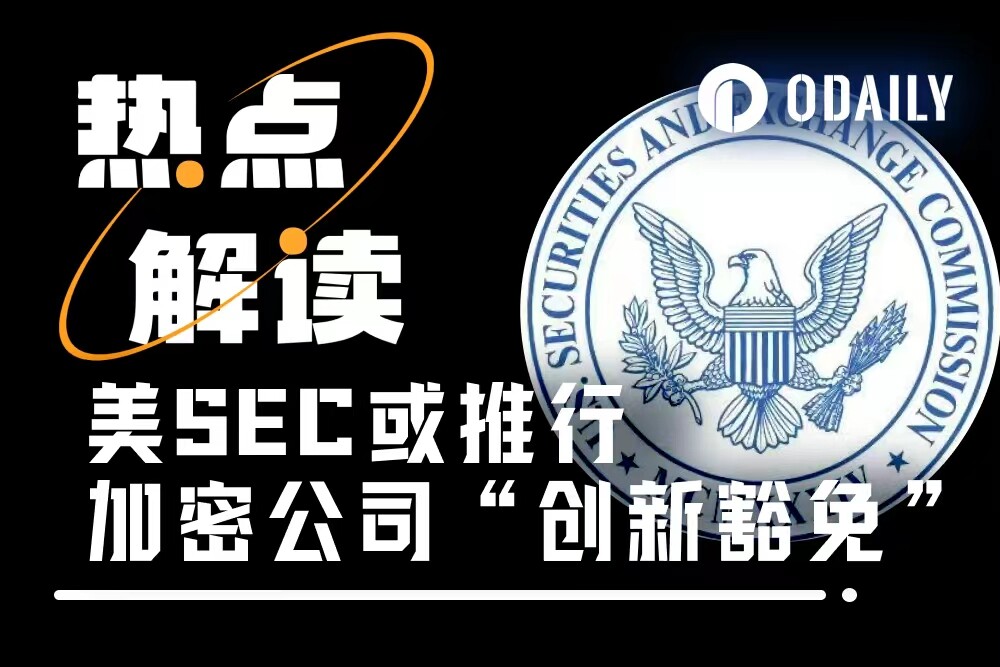Regulatory relaxation: SEC launches "innovation exemption" mechanism, allowing crypto companies to "get on board first and pay for the ticket later"
Original | Odaily Planet Daily ( @OdailyChina )
By Wenser ( @wenser 2010 )
Yesterday, US SEC Chairman Paul Atkins proposed an "innovation exemption" mechanism for crypto companies to encourage the rapid launch of innovative cryptocurrency products. Previously, the SEC and CFTC had already joined forces to open up the US market. Coupled with favorable policies such as the expected passage of the Crypto Market Structure Act, the possible early approval of Ethereum-collateralized ETFs, and Trump's promotion of a crypto retirement plan, the US crypto market is expected to experience rapid growth in both products and funds . Odaily Planet Daily will conduct a forward-looking analysis based on these policy trends. Recommended reading : "The US SEC and CFTC Join Forces for the First Time: US Crypto Regulation Takes a Comprehensive Shift, Opening Perpetual Contracts and 24/7 Trading"
The “Innovation Exemption Mechanism” may be implemented. Will crypto companies be able to “get on the bus first and buy tickets later”?
In early September, the US SEC and CFTC issued a joint statement, stating their intention to enhance US market competitiveness through regulatory harmonization, closing regulatory gaps, extending trading hours, and utilizing innovative exemptions . Now, an innovative exemption mechanism for crypto companies (i.e., regulated entities) may be implemented first, with a deadline set for the end of this year.
Specifically, this exemption will allow crypto companies to temporarily waive the constraints of existing securities regulations (such as securities certification under the Howey test), allowing them to quickly launch new digital asset products (such as tokenized assets, blockchain infrastructure, or multi-asset exchange-traded products (ETPs)). Amidst the current sluggish IPO activity in the United States, this move will effectively boost the development of crypto IPOs.
The role played by the U.S. SEC in this process is like a "parent" who does not intervene too much and provides an "experimental environment"; many U.S.-based crypto companies, especially DeFi protocols, cryptocurrency exchanges, and asset management institutions that apply for various ETF funds, have greater freedom to conduct different types of product business attempts.
This also means that a "temporary regulatory easing policy" will help crypto companies operate under lighter regulatory oversight standards while the SEC develops its own rules. This model is similar to international "sandbox" practices, but focuses more on principled conditions rather than strict requirements. This move will undoubtedly greatly encourage crypto companies to launch new products, new businesses, and new models. After all, compared to the previous regulatory environment with its numerous red lines, the primary condition for promoting the development of the crypto market is the removal of unnecessary restrictions.
In addition, this policy echoes the GENIUS Act, a stablecoin regulatory bill promoted by the U.S. Congress, and the PWG report of the Presidential Working Group on Financial Markets. As the main driving force behind Project Crypto, the U.S. SEC's long-term goal is to localize crypto distribution and custody rules and eliminate reliance on offshore structures.
Notably, this also reflects the starkly different regulatory approaches of current SEC Chairman Paul Atkins and former SEC Chairman Gary Gensler, who recently publicly stated that he "has no regrets about strictly regulating the crypto industry during his tenure." This stark contrast between the two also indirectly highlights the necessity and urgency of crypto-friendly regulation in the United States today—after all, destruction is always easier than construction.
This may also be an important reason why U.S. regulators will launch a series of favorable policies in the second half of this year. They need to create an environment for the rapid development of the U.S. crypto industry on the basis of eliminating the "mess" left by the former SEC chairman during the Biden administration.
A series of favorable factors are ready to take off, and the $93 billion purchase of Trump's crypto retirement plan is still on the way.
In the coming quarter, the U.S. crypto market will also usher in a series of favorable policies, including:
In mid-September, the US SEC announced that spot cryptocurrency ETFs, excluding BTC/ETH, now have a streamlined 75-day listing process. Bitwise CIO Matt Hougan stated that universal listing standards could be implemented as early as October. While there's no guarantee of capital inflows, this could usher in a surge of new cryptocurrency ETPs, a fact borne out by the history of ETF development. Bloomberg ETF analyst Eric Balchunas commented , "Historically, the last time the US Securities and Exchange Commission (SEC) implemented such standards for ETFs, the number of listings doubled. Over 100 cryptocurrency ETFs could be listed in the next 12 months." Faraday Future founder Jia Yueting also commented, "The SEC's streamlined crypto ETF listing process opens the door for assets like Solana."
On September 20, although the deadline for the U.S. SEC to finally approve the ETH pledge ETF is April 2026, analyst Axel Bitblaze said that approval is expected to be brought forward to October 2025. He added: "BlackRock's next deadline for ETH pledge approval is in October, and I think approval is likely to happen."
On September 23rd, nine US lawmakers (including House Financial Services Committee Chair French Hill and Capital Markets Subcommittee Chair Ann Wagner) wrote to SEC Chairman Paul Atkins, urging him to expedite implementation of President Trump's August executive order "Democratizing Access to Alternative Assets for 401(k) Investors." The lawmakers asked the SEC to assist the Department of Labor in adjusting regulations to allow crypto assets to be included in 401(k) retirement plans. The letter noted that approximately 90 million US retirement investors are currently restricted from allocating to alternative assets. Allowing 401(k) plans to allocate 1% of their funds to crypto assets could bring in $93 billion in incremental funds, exceeding the $60.6 billion in inflows into Bitcoin spot ETFs since January 2024.
Yesterday, Patrick Witt, Executive Director of the White House Digital Asset Advisory Council, stated at the 2025 Korea Blockchain Week conference that he expects the Crypto Market Structure Act to be passed by the end of 2025. The bill aims to establish a comprehensive regulatory framework for digital assets and clarify the division of responsibilities between the CFTC and the SEC in crypto regulation. He emphasized that the White House is actively promoting the repatriation of overseas crypto companies and stated that the government stands ready to engage in dialogue with the industry. Currently, the Republican-led CLARITY Act has passed the House of Representatives with bipartisan support, and the Senate has also introduced the Responsible Financial Innovation Act of 2025.
Furthermore, during the recent announcement of the innovative exemption mechanism, SEC Chairman Paul Atkins reiterated that the US must prioritize commercial viability and avoid old rules that hinder entrepreneurship. Combined with his recent slogan, "Make IPOs Great Again," in a Fox Business interview , this demonstrates his resolve and confidence in revitalizing the US crypto economy.
Conclusion: The US crypto industry must be rebuilt before it can be rebuilt
Of course, a somewhat radical policy shift carries certain risks. For example, several innovative policies could lead to a weakening of US investor protections and exacerbate short-term market volatility. Furthermore, the specific effectiveness of these policies remains to be seen. The SEC and CFTC roundtable meeting will be held as scheduled on September 29th, providing further clarity on policy changes.
But no matter what, the Trump administration’s determination to “maintain crypto-friendliness to the end” is certain. The next step is to wait and see when the capital side will enter the market.
- 核心观点:美国加密监管政策转向友好,推动市场快速发展。
- 关键要素:
- SEC推出创新豁免机制,放宽产品上线限制。
- 加密ETF审批加速,退休计划或引入930亿美元。
- 市场结构法案有望年底前通过,明确监管分工。
- 市场影响:吸引资金与产品创新,提升市场活跃度。
- 时效性标注:中期影响



